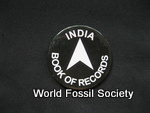Evolution, it seems, sometimes jumps instead of crawls. A research team led by a University of Chicago scientist has discovered two key mutations that sparked a hormonal revolution 500 million years ago. In a feat of “molecular time travel,” the researchers resurrected and analyzed the functions of the ancestors of genes that play key roles […]
Posts Tagged ‘Russel T Sajeev’
Slow Earthquakes: It’s All in the Rock Mechanics
 June 24th, 2013
June 24th, 2013  Riffin
Riffin Earthquakes that last minutes rather than seconds are a relatively recent discovery, according to an international team of seismologists. Researchers have been aware of these slow earthquakes, only for the past five to 10 years because of new tools and new observations, but these tools may explain the triggering of some normal earthquakes and could […]
Oddest Couple Share 250 Million Year Old Burrow
 June 23rd, 2013
June 23rd, 2013  Riffin
Riffin Scientists from South Africa, Australia and France have discovered a world first association while scanning a 250 million year old fossilised burrow from the Karoo Basin of South Africa. The burrow revealed two unrelated vertebrate animals nestled together and fossilised after being trapped by a flash flood event. Facing harsh climatic conditions subsequent to the […]
Himalayan Tsunami 2013 : Nature’s Fury OR Human negligence?
 June 22nd, 2013
June 22nd, 2013  Riffin
Riffin Melting glaciers and rising temperatures are forming a potentially destructive combination in the deep ravines of Nepal’s Himalayan foothills, and the Phulping Bridge — on the Araniko Highway linking Kathmandu with the Chinese border — is a good place to see just how dangerous the pairing can be. A bare concrete pillar stands there, […]
New ‘Embryonic’ Subduction Zone Found
 June 22nd, 2013
June 22nd, 2013  Riffin
Riffin A new subduction zone forming off the coast of Portugal heralds the beginning of a cycle that will see the Atlantic Ocean close as continental Europe moves closer to America. Published in Geology, new research led by Monash University geologists has detected the first evidence that a passive margin in the Atlantic ocean is becoming […]
Feeding Mechanics in Spinosaurid Theropods and Extant Crocodilians
 June 21st, 2013
June 21st, 2013  Riffin
Riffin A number of extant and extinct archosaurs evolved an elongate, narrow rostrum. This longirostrine condition has been associated with a diet comprising a higher proportion of fish and smaller prey items compared to taxa with broader, more robust snouts. The evolution of longirostrine morphology and a bulbous anterior rosette of premaxillary teeth also occurs in […]
Scientists Date Prehistoric Bacterial Invasion Still Present in Today’s Plant and Animal Cells
 June 20th, 2013
June 20th, 2013  Riffin
Riffin Long before Earth became lush, when life consisted of single-celled organisms afloat in a planet-wide sea, bacteria invaded the ancient ancestors of plants and animals and took up permanent residence. One bacterium eventually became the mitochondria that today power all plant and animal cells; another became the chloroplast that turns sunlight into energy in green […]
How Diving Mammals Evolve Underwater Endurance?
 June 18th, 2013
June 18th, 2013  Riffin
Riffin Scientists at the University of Liverpool have shed new light on how diving mammals, such as the sperm whale, have evolved to survive for long periods underwater without breathing. The team identified a distinctive molecular signature of the oxygen-binding protein myoglobin in the sperm whale and other diving mammals, which allowed them to trace the […]
Fossil Kangaroo Teeth Reveal Mosaic of Pliocene Ecosystems in Queensland
 June 17th, 2013
June 17th, 2013  Riffin
Riffin The teeth of a kangaroo and other extinct marsupials reveal that southeastern Queensland 2.5-5-million-years ago was a mosaic of tropical forests, wetlands and grasslands and much less arid than previously thought. The chemical analysis of tooth enamel that suggests this diverse prehistoric habitat is published June 12 in the open access journal PLOS ONE by […]
An Extraordinary Gobioid Fish Fossil from Southern France
 June 16th, 2013
June 16th, 2013  Riffin
Riffin The classification of gobioid fishes is still under discussion. Several lineages, including the Eleotridae and Butidae, remain difficult to characterize because synapomorphies are rare (Eleotridae) or have not yet been determined (Butidae). Moreover, the fossil record of these groups is scarce. Results Exceptionally well-preserved fish fossils with otoliths in situ from uppermost Oligocene sediments (≈23–24 […]



 Posted in
Posted in  Tags:
Tags: 
